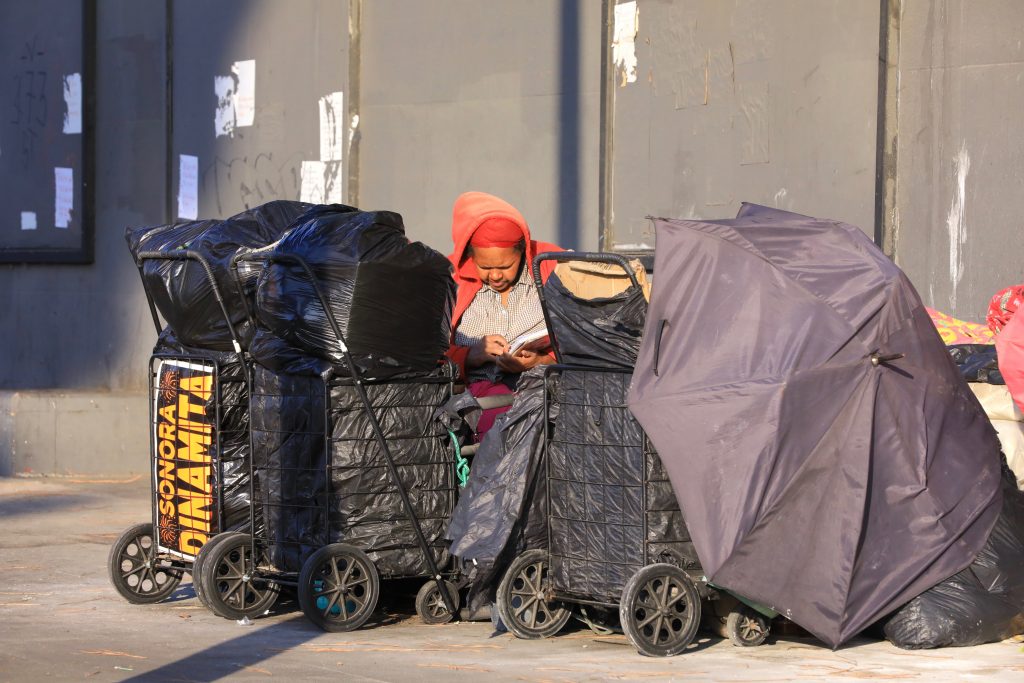For the Oct. 30 - Nov. 7 special election issue of Angelus, we asked a handful of Catholic thinkers to offer their thoughts on the issues that American Catholics should care about for the next four years, independent of the candidates or political party that govern after the Nov. 3 elections.
Each day starting Oct. 27, one of the seven essays from our guest contributors will be published on AngelusNews.com.
Residents of the Archdiocese of Los Angeles don’t need to be persuaded that homelessness is a critical issue this election.
They see or experience this misery every day. At last count, almost a quarter of the estimated 568,000 men, women, and children experiencing homelessness in the United States lived in California. Around 59,000 were counted in Los Angeles County alone, the great majority living on the street.
And that was before coronavirus (COVID-19) and the wake-up calls of 2020.

Too easily our society has treated homelessness as an individual misfortune or a lifestyle choice. The events of this year have dropped the scales from our eyes. When we see homelessness, we’re seeing the failure of our community to support the economic well-being of all its citizens in times of crisis.
Without a secure place to live, those experiencing homelessness are at greater risk of illness, hospitalization, and death. Without addressing racial disparities in access to housing, our communities can expect new inflows into homelessness. Without federal action to assist households at risk of eviction, economists project that the homeless population may increase by more than 40% after the eviction moratorium ends.
Awakened by the pandemic, we’re seeing a new sense of urgency emerging to solve homelessness, alongside an eagerness to know what works and what policies and approaches to support. Communities across the country have proven that homelessness is solvable. What we’ve learned is that it starts with accountability and a commitment to results.
I lead a nonprofit organization, Community Solutions, that supports more than 80 cities and counties working together toward “zero” homelessness in their communities. This means in practice that in their communities, homelessness is rare overall and brief when it occurs because a coordinated system is in place to prevent most homelessness and to rehouse more people each month than those who become homeless.
Participation in this network of “Built for Zero” communities is voluntary. These local teams commit themselves to a new way of working, using a public health approach that embraces the goal of zero homelessness across their community.
Since 2015, more than half of these communities have reduced — and in some cases, ended — chronic or veteran homelessness on their way to a comprehensive solution.
Their success tells us about the federal and local policies that are needed to get results and what we should expect of our leaders at all levels of government. It tells us what we should do to protect one another from ever experiencing the indignity and nightmare of homelessness.
We should be advocating and working for the following:
- Policies that support a public health approach. Good individual programs for addressing homelessness don’t add up to zero homelessness in a community. They must be part of a system that is accountable for results. Homelessness needs to be approached as a public health challenge: measured in real time, with each individual accounted for, and regular public reporting on current rates of homelessness and actions taken to reduce it.
- Policies that support collaboration and efficiency. Those experiencing homelessness typically interact with many organizations to try to piece together the help they need. It should be the job of organizations to eliminate the fragmentation that harms vulnerable people and adds unnecessary time and cost. We need policies that reinforce collaboration, reduce bureaucracy, and incent reducing homelessness.
- Policies that support quality data and data sharing. Having a comprehensive, accurate view of homelessness at all times is key to a community knowing what’s working to reduce homelessness and how the issue is moving and changing. Federal and local policies are needed that create common data standards, establish regular reporting requirements, and enable critical data to be collected easily and appropriately shared among collaborating organizations.
- Policies that expand rental assistance. Perhaps the single most impactful step our federal government could take is expanding rental assistance to all eligible households. This is a smart investment in the strength of our communities.
- Policies that support innovation in housing. Communities need new ways of financing, building and managing housing, a range of housing options that fit the needs and preferences of all their residents, and ways of taking an honest look at their housing supply and what policies they need to assure a decent home for all; policies that enable housing options to keep pace with demographic changes in their community are a step in that direction.
The pandemic has clarified our sight and the need to make ending homelessness a shared national mission. The urgency is clear. Misguided policies created homelessness. Effective ones can end it.

